Sleep is fundamental to health, but what we sleep on can affect more than just comfort. Sustainable AND non-toxic bedding brands can’t guarantee your sleep (no one can), but they sure can help prevent sleepless nights worrying about toxins and eco-guilt.
Conventional bedding often harbors harmful chemicals (like PFAS, phthalates, synthetic dyes, flame retardants, and pesticide residues) that may impair health, particularly for children. At the same time, synthetic fibers shed microplastics during washing, contributing significantly to environmental pollution, and to negative human health outcomes.
Farming and manufacturing practices for bedding materials also bear heavy social and ecological costs. That’s why choosing sustainable bedding isn’t simply about eco-credentials; it’s about sleeping soundly, investing in your well-being, and supporting ethical and environmental integrity from fiber to finish.
To that end, we’ve researched, tested, and slept in a range of bedding made by brands that not only ensure that responsible materials are used but also ethical labor, low-impact dyes, and broader green business practices. To find out more about why we think it’s important to carefully consider your bedding choices, and how we go about finding brands for this list, we’ve included a detailed guide at the bottom of this article.
Additionally, our Brand Rating System now extends what we look for in brands (who opt in) to a much wider range of sustainability-related criteria, like chemical use, circularity, chemical management, health & safety, biodiversity impact, and more. Look out for rated brands on the list below and find others in our directory.
We independently research all featured brands and we ask them to confirm their claims. In many cases we personally review recommended products. This post contains affiliate links which means we may earn a commission if you buy something. We explain this further in our Terms of Use.
Sustainable Bed Sheets From Better Brands
MagicLinen offers bedding in delightful earthy solid colors, made from OEKO-TEX-certified European linen in fair factories that support talented seamstresses. SJ Co-founders have slept in a linen set for years (in Matcha Green) that they love more and more as it gets softer with time, especially in summer. Magic Linen has been comprehensively rated by us on their sustainability credentials – see the full rating.
Nest Bedding makes a range of TENCEL™ lyocell, bamboo, and organic cotton sheets that are OEKO-TEX® certified. Amber was super impressed with their comfortable organic sateen sheets (in terracotta). She’s found them to be buttery soft, breathable, and cooling. Nest Bedding has been comprehensively rated by us on their sustainability credentials – see the full rating.
PlushBeds’ linens are as luxurious as they are eco-friendly. They combine the best of both, using materials like GOTS-certified organic cotton and TENCEL™ and we’re happy to say we’ve had many deep sleeps in them. PlushBeds has been comprehensively rated by us on their sustainability credentials – see the full rating.
Watch our video below on what to look for when it comes to environmentally-friendly bedding:
Index: Non-toxic Bed Sheets
- MagicLinen Jump to brand
- Nest Bedding Jump to brand
- PlushBeds Jump to brand
- Of an Origin Jump to brand
- Naturepedic Jump to brand
- Avocado Jump to brand
- Antipodean Home Jump to brand
- Pact Jump to brand
- Boll & Branch Jump to brand
MagicLinen
Compostable
All or some products are compostable, either in an industrial facility or at homeEthical Sourcing
Raw materials have been sourced ethically with people and planet in mind.Handcrafted
Products have been made by hand, typically by an artisan or group of artisans.Made To Order
Products can be made to order, thus limiting unnecessary productionNon-toxic
All products are made with ingredients or materials that are currently considered non-toxicPlastic-free
All products are entirely plastic-freeSustainable Materials or Ingredients
Either all or most products are made with sustainable materials or ingredients.Thoughtful packaging
Product packaging has been designed and created with the end of life outcome in mind and can be easily recycled or composted.Vegan
This brand does not use any animal products or by-products in their productsWoman Owned
This brand is owned by a woman or a group of women.Price Range: $34—$371
If the name didn’t clue you in, MagicLinen is a slumber specialist in linen bedding. Based in Vilnius, Lithuania, they offer a selection of clothing and homewares like curtains, linen sheets, duvet covers, pillowcases, blankets, and sets. The delightful earthy solid colors will light up your bedroom—and help you sleep cool when the lights go out.
They join the ranks of other linen bedding brands, by using refined…you guessed it, linen in their sheets and bedding. Specifically, OEKO-TEX-certified European linen that’s naturally hypoallergenic. The buttons on the end of the duvet covers are made from natural materials that include coconut.
Your linen bedding will come in biodegradable cornstarch PBAT mailers. Products are made in-season to order to prevent overstock waste and their in-house manufacturing means they have complete control over waste, which is used to create smaller items like tea towels and oven mitts.
MagicLinen has been rated by Sustainable Jungle. See the full rating.
Our Personal Review of Magic Linen’s Bedding:
“We tested the Magic Linen Linen Duvet Set in Matcha Green. We love the color, it brightens up the bedroom and adds a cozy, natural aesthetic. Definitely the most stylish set we own. Something which took a bit of getting used to, as we’ve never owned linen bedding before, was that the fabric initially is a bit rough. Typical for linen, but after a few washes it gets softer. Our favorite aspect is how breathable it is. There’s nothing better for summer nights, and even in the winter if your duvet is heavy enough it still offers a fair bit of warmth. The quality is also obviously top notch, no issues with the stitching after a few years of use (cold wash and air drying) and the little coconut buttons are a nice touch too.”
Review by Joy and Lyall, SJ Co-founders
Nest Bedding
Ethical Sourcing
Raw materials have been sourced ethically with people and planet in mind.Made To Order
Products can be made to order, thus limiting unnecessary productionNon-toxic
All products are made with ingredients or materials that are currently considered non-toxicOrganic
Products are made from organic materials.Recycled materials
Some or all products are made with recycled materialsThoughtful packaging
Product packaging has been designed and created with the end of life outcome in mind and can be easily recycled or composted.Woman Owned
This brand is owned by a woman or a group of women.Price Range: $24—$499
Nest Bedding began as one of the first bed-in-a-box companies, let alone a sustainably-minded one. From there, they curated a complete collection of chemical-free bedding that includes pillows, protectors, comforters, blankets, duvet covers, sheets, and sustainable kid’s bedding.
Choose between 100% Fair Trade and GOTS-certified organic cotton, or OEKO-TEX-certified bamboo bedding. If you’re vegan, note a few products contain wool or mulberry silk, but if you like the feel of ethical silk sheets but prefer your covers to be cruelty-free, choose those made of eucalyptus-derived TENCEL™ Lyocell. These products are ‘lovingly gathered’ worldwide through fair, conscious channels, such as their USA-grown organic cotton. Their organic cotton is also Flocert certified.
Their textile partners hold numerous certifications including SEDEX, Fair Trade USA, Fairtrade International, and GOTS.
Rather than plastic bags as product protectors, Nest uses reusable cotton bags.
We tested Nest Bedding’s Organic Sateen Sheets, Organic Cotton Waterproof Mattress Protector, and their Washable Wool Comforter – see results of our testing below.
Nest Bedding has been rated by Sustainable Jungle. See the full rating.
My Personal Reviews of Nest Bedding’s Sustainable Bedding:
Organic Sateen Sheets:
“I got the sheet set in lovely warm terracotta color but that’s the only thing warm about these. I’ve been testing them in summer time, and find this sheet set buttery soft, breathable, and cooling even in my hot bedroom loft, which makes sliding into bed at night such a treat. I love that it comes with four pillowcases—finally, no more mismatched pillows on the bed! My only tiny complaint is that the fitted sheet doesn’t label the top or bottom, so there’s sometimes a bit of fumbling when making the bed”
Organic Cotton Mattress Protector:
“The Nest Bedding Organic Cotton Mattress Protector is impressively soft and quiet—no annoying crinkly sounds when I move around. It fits snugly on my deep mattress and gives me peace of mind knowing spills (as I am regularly known to do) won’t soak through and damage my mattress. Plus, I’ve been testing it out right in the height of summer and I find doesn’t trap heat like some other protectors I’ve tried.”
Washable Wool Comforter:
“I can’t recommend the Washable Wool Comforter enough. Featuring a super soft 300 thread count organic cotton comforter cover stuffed with 250-GSM of washable wool, this is one heavy-duty and durable comforter I trust will grace our bed for years to come. I live in a cold climate, so we especially love it in the winter months, but it’s also suitable for year-round use. I also love that it comes with a sturdy zipped storage bag, so I can keep it clean and safe in storage when not in use (though that’s turned out to be fairly rare!). Because we so often use the comforter now, the bag also makes for a handy tote and storage for other stuff.”
Reviews by Amber McDaniel, SJ’s Head of Content
PlushBeds
Ethical Sourcing
Raw materials have been sourced ethically with people and planet in mind.Locally Made
Products are made local to the brand's headquarters.Made To Order
Products can be made to order, thus limiting unnecessary productionNon-toxic
All products are made with ingredients or materials that are currently considered non-toxicOrganic
Products are made from organic materials.Sustainable Materials or Ingredients
Either all or most products are made with sustainable materials or ingredients.Price Range: $149—$627
PlushBeds equals “pure eco-friendly luxurious comfort at an unparalleled price point”. Don’t take their word for it, take our word and read our in-depth PlushBeds review.
Offering factory-direct means more transparency and some of the most affordable eco-friendly bedding in a variety of fabrics, colors, and sizes (twin, full, queen, king, Cali king, and oversized queen). You’ll find GOTS-certified organic cotton bedding as well as TENCEL™ or linen. You can also get TENCEL™ lyocell sheets and a quilt comforter is made from cruelty free Eco-Wool®.
They also offer microfiber sheets and those made of bamboo rayon fabric which we would personally avoid in favor of the organic cotton or TENCEL™ options.
PlushBeds owns a GOLS and GOTS-certified factory in California that makes all their organic mattresses, sheets, and organic pillows—meaning sustainable bedding made in the USA. When it comes to sourcing, they try to meet and establish personal relationships with their farmers.
They work with TerraPass Carbon Neutral to calculate the emissions of running their website and offset this footprint. The brand is also a Green America Certified Business and member of the Sustainable Furnishings Council, working to promote sustainable practices in the industry. The PlushBeds Green Scholarships program provides a $1,000 scholarship to a college student seeking an “eco-degree” (AKA environment-related major).
PlushBeds has been rated by Sustainable Jungle. See the full rating.
My Personal Review of PlushBed’s Vegan Silk Sheets:
“All of their luxurious bedding is impressive, but I’m an extra big fan of the Vegan Silk Sheets. Instead of ethically concerning silk, they mimic the coveted silky texture using only plant-based TENCEL™. If you’re skeptical that TENCEL™ can feel as good as real silk, I was, too. Suffice it to say I was more than pleased the first time I touched them. The light, breathable texture is especially optimal for warmer months.”
Review by Amber McDaniel, SJ’s Head of Content
Of an Origin
Price Range: $144—$200
Of an Origin offers a thoughtfully designed collection of organic cotton and linen bedding. Their range includes two fabric lines: PureWeave Percale, crafted from 100% organic cotton, and DreamWeave, a breathable blend of linen and cotton ideal for year-round comfort. Both use only natural, non-toxic materials and are free from harmful chemicals.
All their non-toxic bedding is ethically made under fair trade standards, supporting artisans in India and Peru. The brand works closely with a family-run factory in Peru and partners with NGOs on reforestation, clean water access, and clothing donation initiatives for vulnerable communities in the Andes. The U.S.-based arm of production is a women-owned factory in Los Angeles that emphasizes worker well-being and safe, ethical practices.
Packaging is biodegradable or recyclable, and suppliers are chosen for their commitment to environmental and social responsibility, including OEKO-TEX® certified partners.
Naturepedic
Price Range: $49—$179
While Naturepedic specialize in mattresses and toppers they also offer sheets, pillowcases, pillow protectors, and a non-toxic crib bedding set. They use OCS100-certified organic cotton, wool, and organic latex (for the mattresses and toppers only) and they also offer PETA-approved vegan options as well.
Naturepedic is family-owned and prioritizes working with Amish craftspeople and other US artisans. Their vendors have an impressive collection of certifications (including GOTS, GOLS, and FSC).
In addition to sustainable bedding fabrics, they use FSC certified or recycled paper tags, with their cardboard boxes being partially recycled. They are also a member of Green America and are GreenGuard Gold and MADE SAFE-certified, meaning that they have low chemical emissions and have several programs in place to reduce production impact.
Avocado
Price Range: $49—$829
Avocado is short for Avocado Green Mattress, which should clue you in as to what their main mission involves.
But apart from their over-qualified appearance on our sustainable mattresses guide, they offer everything that goes on or beneath it: from bed frames to sustainable linens. Their bedding options includes 400 or 600 thread count adult sheets, crib sheets, duvets (covers and inserts), and blankets.
For organic sheets or duvet covers, you choose between organic linen, organic cotton, and organic hemp—all 100% in content and GOTS-certified. Two products are not vegan friendly: their Mini Silk Pillowcase made from 100% Mulberry silk and a Peruvian alpaca wool duvet insert. Some materials, like their hemp, are MADE SAFE certified, too.
Avocado is a Certified B Corp. Products are made in-house in a GOTS-certified California facility that provides fair wages, healthcare, vacation, and other benefits. By offsetting through the Bonneville Environmental Foundation, Avocado is The Climate Label certified and a member of the Sustainable Furnishings Council.
Antipodean Home
Price Range: $189—$712
Antipodean Home has “The Right Fluff” for your bedroom via a simple but essential range of sheet sets, duvet covers, duvet inserts, and a bundle of all three.
Their bedding features OEKO-TEX certified organic and regenerative materials, including ZQ-certified Regenerative (ZQRZ) merino wool—sourced from hand-selected fleeces to be the highest quality fibers around—RWS-certified wool, and GOTS-certified organic cotton. Even the buttons of their duvet covers are all-natural and made from corozo nuts.
Antipodean Home sources wool primarily from the New Zealand Merino Company (NZM), whose 3.7 million acres are bringing regenerative agriculture to the industry on a mass scale. All wool is fully traceable to the farm of origin, who comply with the highest animal welfare standards.
Wool fibers are processed in a New Zealand facility accredited with New Zealand National Farm Assurance (NZFA), which, in addition to requiring full farm traceability and animal welfare, has biosecurity and sustainability standards, like cleaning the fibers with the lowest level of fiber residue. Having joined Textile Exchange’s Climate+ goal, the brand is using SBTi to measure and reduce scope 1 and 2 greenhouse gas emissions.
My Personal Review of Antipodean Home’s Organic Cotton Sheet Set & Regenerative Wool Comforter:
“I tested out the Regenerative Wool Comforter, which they say can improve natural sleep cycles by up to 25% thanks to the temperature regulation, moisture-wicking properties, and hypoallergenic materials. Now, I’m no sleep expert, so I can’t say for sure if my recently improved sleeping patterns are a result of this or not, but I do feel like I’ve been sleeping more soundly and waking up less since putting this on my bed. It might be because I started testing mine right as we rolled into our first summer heatwave—in a house without central AC and only a small, portable AC unit—and these highly breathable materials have done an excellent job keeping me cooler and more comfortable.
The slightly heavier sateen weave of the sheet set came out of the durable and heavy-duty storage tote feeling a little stiff and starchy at first, but by washing it with the wool dryer balls that came complimentary with the set, it immediately softened up and gradually continued to do so as I slept on it over time. I don’t personally love the white color just because my life is too messy for white in general, but otherwise, I have no complaints. I have a fairly deep-fit PlushBeds mattress and had no trouble easily stretching these over to fit the whole frame since they’re rated for mattresses up to 16” deep.”
Review by Amber McDaniel, SJ’s Head of Content
Pact
Price Range: $30—$210
Pact believes “style & sustainability can coexist” and they’re using organic and Fair Trade-certified cotton to prove it.
In addition to basics, activewear, and pajamas, they also sell home textiles like sustainable towels and bedding. In sizes twin to California king, ethical bedding by Pact includes bed sheets, duvet covers, shams, pillowcases, and crib bedding sets. Available in a selection of gorgeous earthy colors, these 100% GOTS-certified organic cotton sheets are “buttery soft to the touch and look undeniably luxe”. And they come in a reusable bag that you can use for storage or laundry-day.
The cotton bedding is produced in Fair Trade factories in India. Pact’s Fair Trade program also goes back to the organic cotton farmer, providing them with finances to help end poverty in their communities.
Pact products come in recycled and compostable packaging via carbon offset shipping.
My Personal Review of Pact’s Tee Jersey Sheets:
“I’ve tried an organic cotton sheet set from Pact (the Tee Jersey range in Smoke Heather). While our bed is a Queen size, we have a King size quilt and I find that the quilt cover does slide off the duvet after a couple of weeks (when we should be washing them anyway) but other than that I love these sheets and find them super cozy and comfortable, especially in Winter. I find the labelling on the sides of the fitted sheet very handy and enjoy that there’s more than enough space to get the fitted sheet on without wrestling the mattress.”
Review by Joy McConnochie, SJ’s Head of Content
Boll & Branch
Price Range: $89—$757
“Change your sheets, change the world.” Scott and Missy Tannen, the co-founders of Boll & Branch started their company with a heightened sense of responsibility following the Rana Plaza collapse in Bangladesh. Voila! One of the best sustainable bedding brands was born.
They also have sustainable sheet sets, pillowcases, duvets, sustainable blankets, and baby bedding—in many sizes and thread counts. If you’re dreaming about quilt bedding, check out their “meticulously stitched” Reserve Lattice Quilt Set. All components are made of 100% organic cotton, (almost) 100% of the time. The only exception is the filling in their comforters, which consists of either RDS-certified American down feathers or partially-recycled PrimaLoft polyfill.
They were the first 100% organic linen manufacturer to become Fair Trade-certified. Their organic cotton travels from India and Turkey (where it’s farmed) to Portugal (where it’s woven) to the USA, where the bedding is made. Shipping by boat rather than air reduces carbon emissions and their products are made using responsible water management. Everything is packaged in recycled paper.
Why Consider Sustainable and Non-Toxic Bedding
Any item coming into our home now has to make it over two enormous hurdles: sustainability (including broad ethical considerations) …and toxicity (including the use of harmful chemicals and the potential for leaching). Bedding is one of the most important items in the home because we spend so much time in it so these hurdles are more important than ever. If you’re not across why these matter, this little explainer will help:
The Impact of Hidden Chemicals in Bedding
Textile materials (both natural and synthetic) can contain a range of chemical substances introduced during fiber production, dyeing, and finishing, many of which can pose risks to human health. These chemicals include:
- Flame retardants, PFAS (per- and polyfluoroalkyl substances, also known as ‘forever chemicals’), phthalates, formaldehyde, and antimicrobials such as triclosan and silver nanoparticles.
- Pesticide residues in conventionally grown cotton, linked to developmental delays, immune dysfunction, and increased cancer risk, particularly among children.
- Dyes (especially azo dyes) derived from petrochemicals, can release carcinogenic amines when in contact with the skin.
A couple of recent studies can help give further context:
- A Canadian in-home study found that children are significantly exposed to semi-volatile organic compounds (SVOCs) like organophosphate esters and phthalates, which have been associated with hormonal disruptions and childhood asthma.
- A recent review suggests there’s an urgent need for standardized cytotoxicity testing of textiles, noting that many chemicals used in modern fabric production penetrate skin, may be inhaled or ingested, and could cause allergic reactions or other toxic effects over prolonged use.
Microplastic Chemical Health Concerns In Bedding
And then there’s microplastics. Professor Dr. Shanna Swan and the Plastic Health Council say that microplastics and plastic-associated chemicals (like phthalates and PFAS in synthetic bedding) are linked to serious health issues, including infertility, cancer, strokes, endocrine disruption, and neurological effects. Alarmingly, microplastics have been detected throughout the human body, including in brains and unborn fetuses.
Microplastic Pollution from Washing Synthetic Bedding
Synthetic fibers like polyester, nylon, and acrylic shed significant numbers of microfibers during washing, which enter waterways and cause havoc in natural ecosystems. They represent approximately 16-35% of ocean microplastics, with individual laundry loads releasing hundreds of thousands of fibers. With synthetic textile production continuing to dominate, this is a serious concern.
Broad Environmental Footprint from Raw Materials
Raw material production for things like bed sheets is typically land-, energy-, water-, and carbon-intensive. For example:
- According to the UN, cotton cultivation requires vast amounts of land (2.5% of the world’s arable land), 200,000 tonnes of pesticides, and 8 million tonnes of fertilizers per year, leading to soil degradation, waterway contamination, and biodiversity loss. It’s environmental footprint is between 1.15kg and 6.07kg CO2e, and it uses the greatest amount of water among all agricultural commodities.
- Synthetic fibers like polyester are derived from fossil fuels and therefore entail high energy input, carbon emissions, and long decomposition times, further exacerbating landfill accumulation and leachate.
Ethical and Social Impact in the Supply Chain
Much like the fashion industry, supply chain transparency is lacking when it comes to bedding production so we don’t really know if the people involved in producing the bedding products were treated well. Poorly regulated production often relies on unsustainable agricultural methods, exploitative labor practices, and poor environmental oversight.
What to Look for in Organic & Sustainable Bedding (Or Not)
Given hunting for sustainable bed sheets is very similar to hunting for sustainable fashion, we look for very similar attributes when pulling together a list like this.
Materials:
- For non-toxic bedding, we would recommend prioritizing organic natural fibers including organic cotton, linen, and hemp.
- Then we’d go for a semi-synthetic fabric like TENCEL™ lyocell bedding (or modal) produced in a closed loop system.
- While used by some on this list, animal fibers like wool and silk are less preferred and we like to see brand’s provide comfort around their animal welfare policies.
When it comes to dyes, we look for undyed, natural or non-azo dyes, and a certification that certifies the final bedding product as non-toxic – see below for more on certifications.
For more guidance on materials, take a look at our guide on sustainable fabrics.
Non-toxic processing:
When it comes to bedding, you want to avoid chemical finishes that make the bedding perform differently for example:
- Antistatic bedding often contains formaldehyde
- Water-resistant bedding would typically contain PFAS
- Wrinkle-free bedding would likely contain PFAS
- Stain-resistant bedding would likely contain PFAs or formaldehyde
- Antimicrobial bedding could contain triclosan or silver nanoparticles
- Shrink resistant bedding may contain formaldehyde
Certifications & Memberships:
We would always recommend looking for key certifications or memberships that ensure ethical bedding brands are what they say they are. These include:
- Material related: Global Organic Textile Standard (GOTS), Organic Content Standard (OCS), OEKO-TEX Standard 100, MADE SAFE, USDA Biobased, Responsible Wool Standard (RWS), ZQ-certified Regenerative (ZQRZ), Forest Stewardship Council (FSC), GreenGuard Gold, PETA-Approved Vegan
- Supply chain related: Fair Trade, FLOCERT, GoodWeave International, Textile Exchange, BSCI, SMETA
We would also want to know the brand does more than just make profit so we value certifications or memberships like B Corporation, The Climate Label and 1 Percent for the Planet.
Product Reviews:
Functional products that perform well are more sustainable products because they don’t end up in landfill prematurely. We’ve personally tested several of the brands on this list and looked at product reviews before recommending others.
Broader Green Business Practices:
We love to see considerations for more than just materials. Including durable products, thoughtful packaging, and regenerative or carbon-neutral practices.
You’ll also notice a few brands on this list who have taken this further and received a brand rating from us, which looks at 22 different sustainability-related criteria. So in our opinion, these are great brands to look at first as you know exactly what you’re getting. You can find these rated sustainable bedding brands and links to their ratings at the top of this list.
Editor’s note: We first published this article in August 2020, originally focused on eco-friendly bedding brands. Since then, we’ve refreshed it regularly so the bedding brands, certifications, and the issues that matter most to you, like human health and toxin exposure in recent updates, reflect the latest information available.
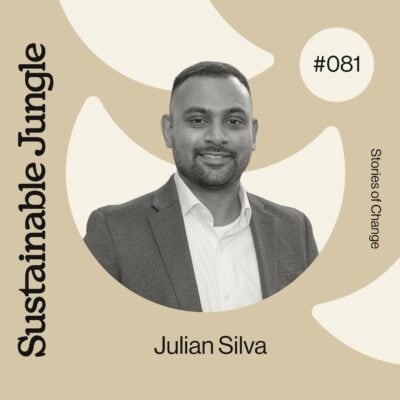
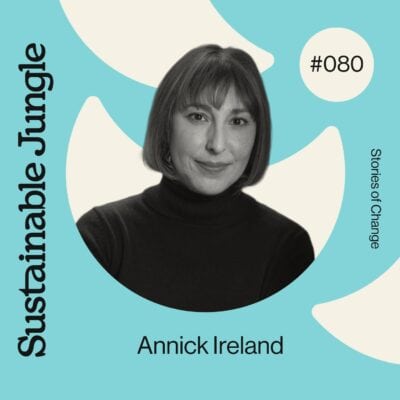

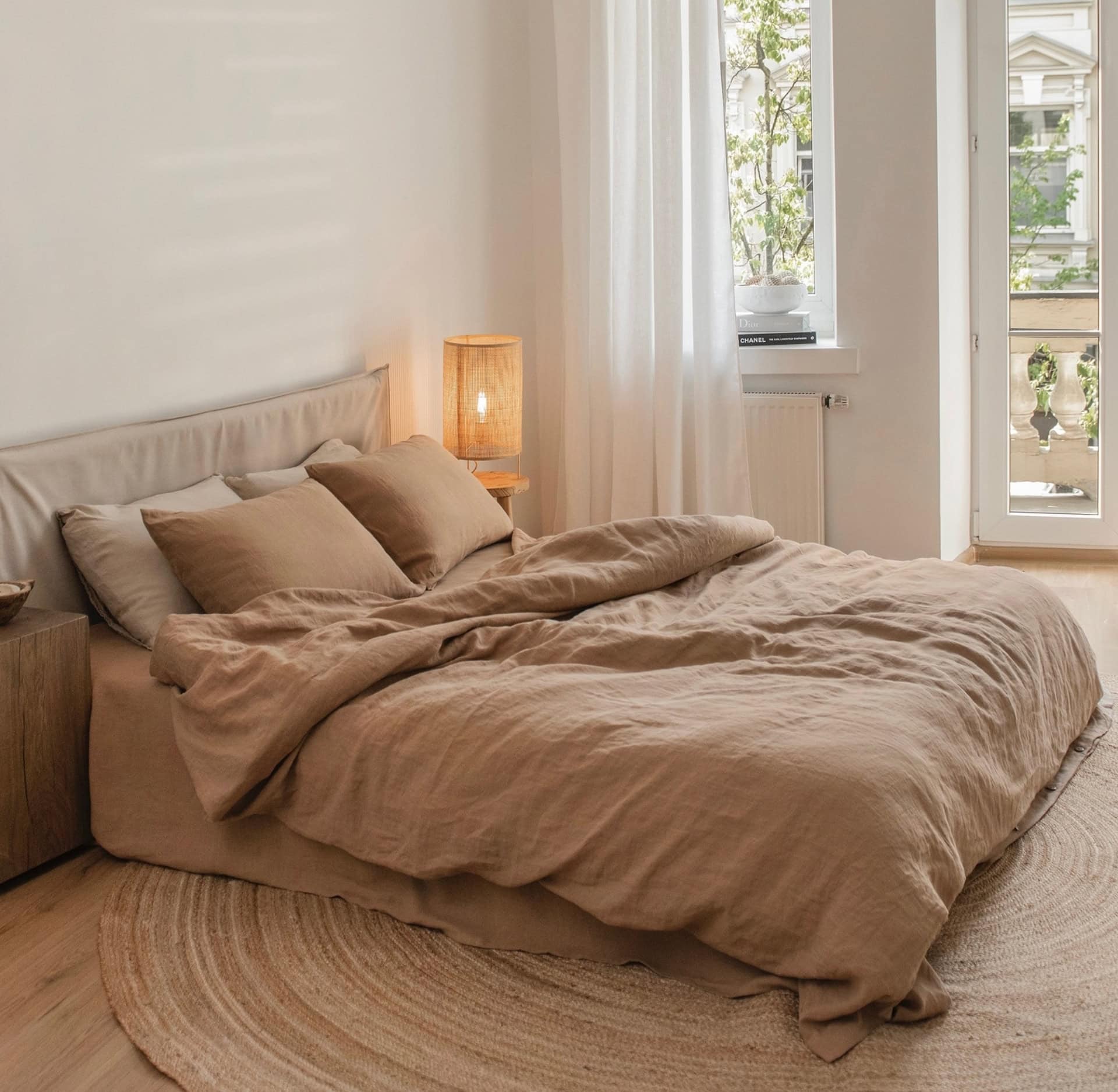
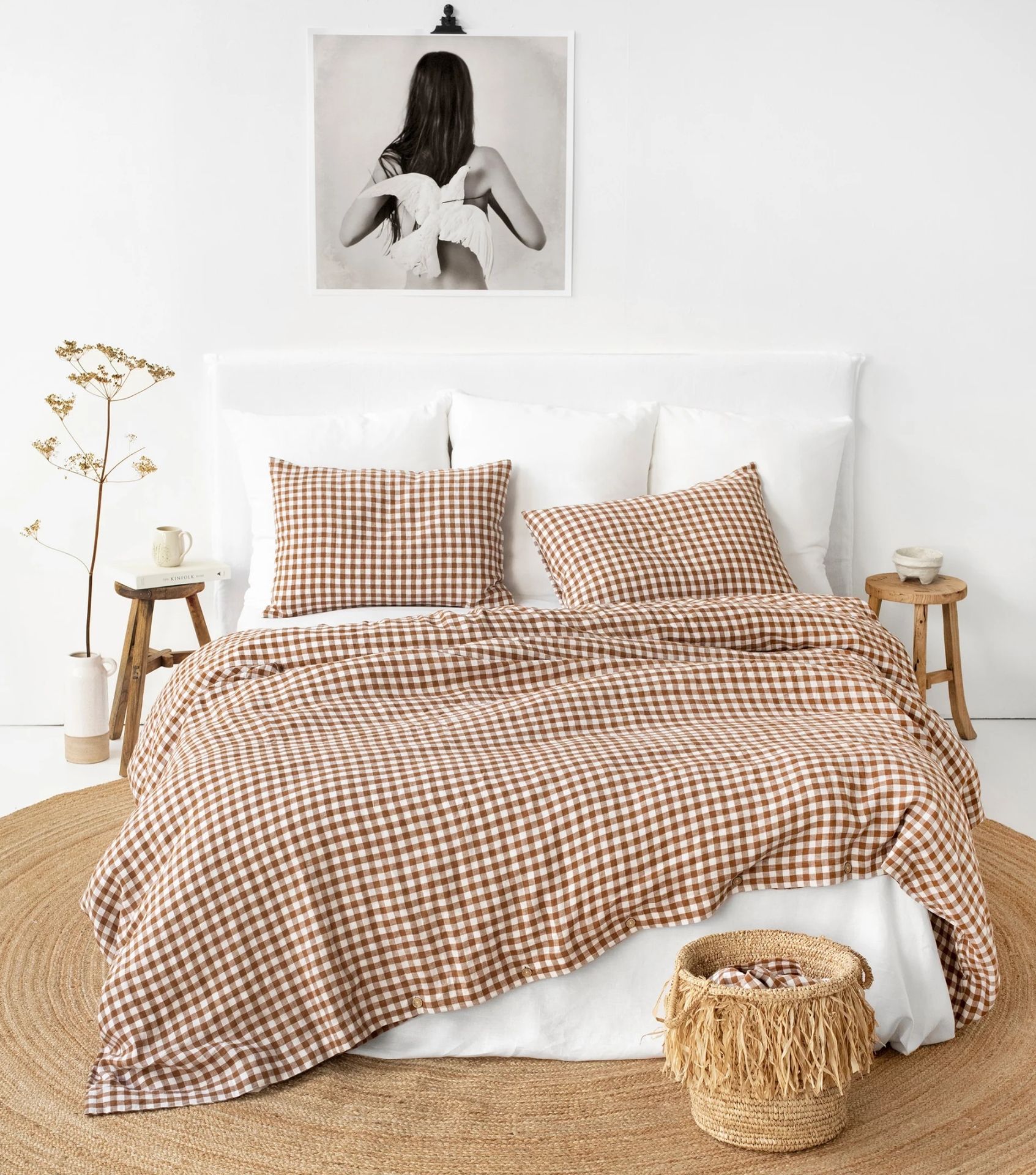
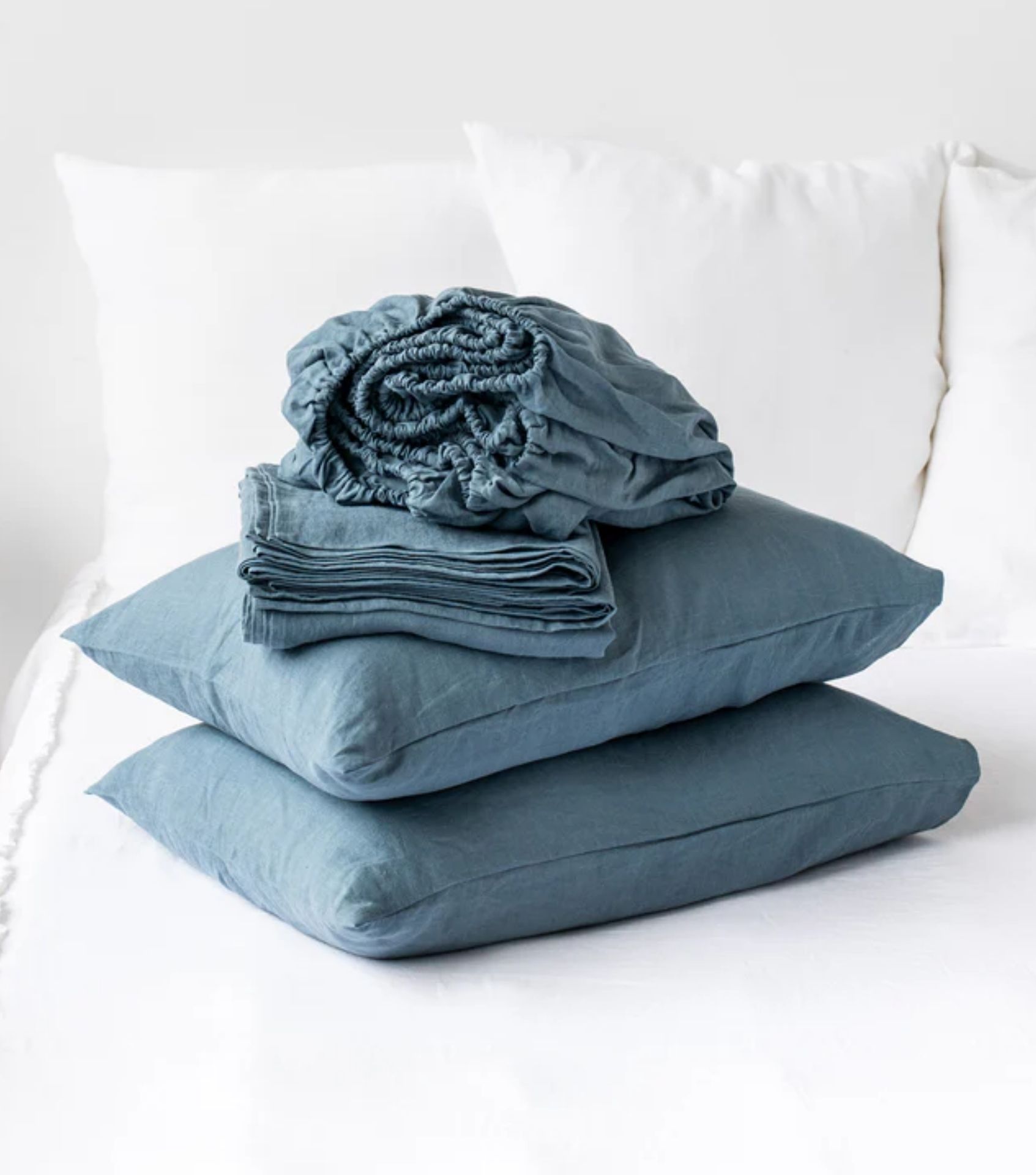
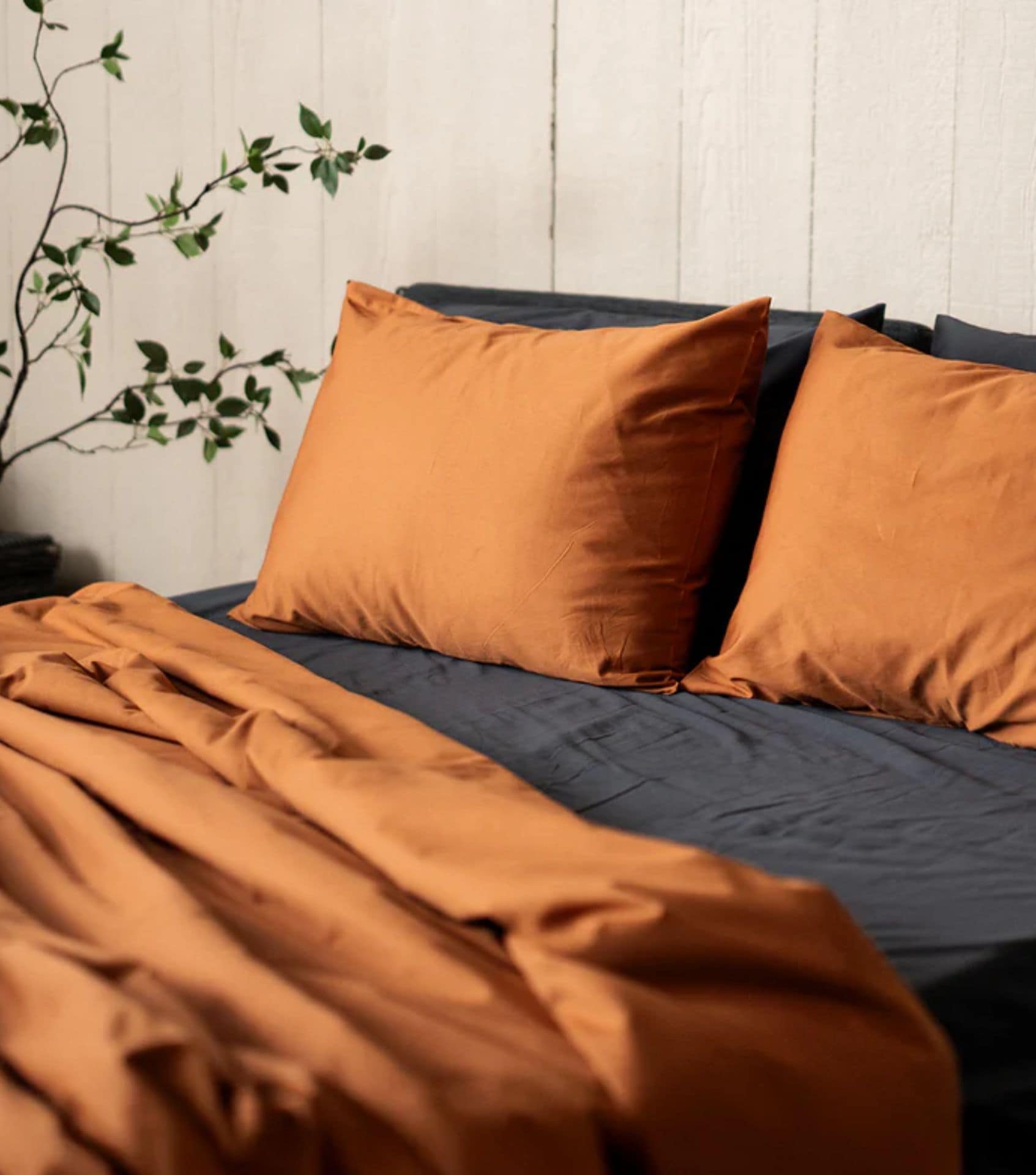
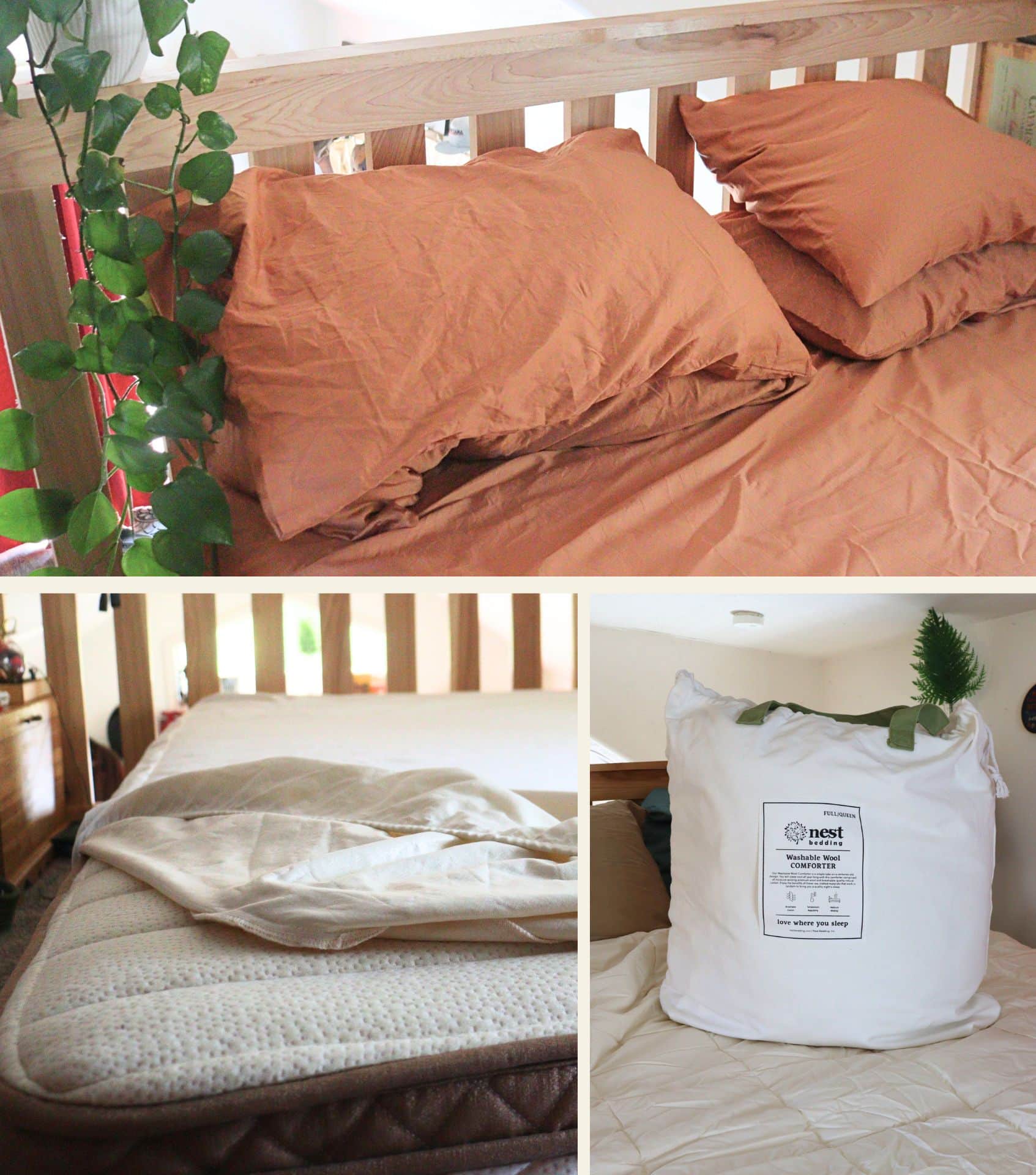
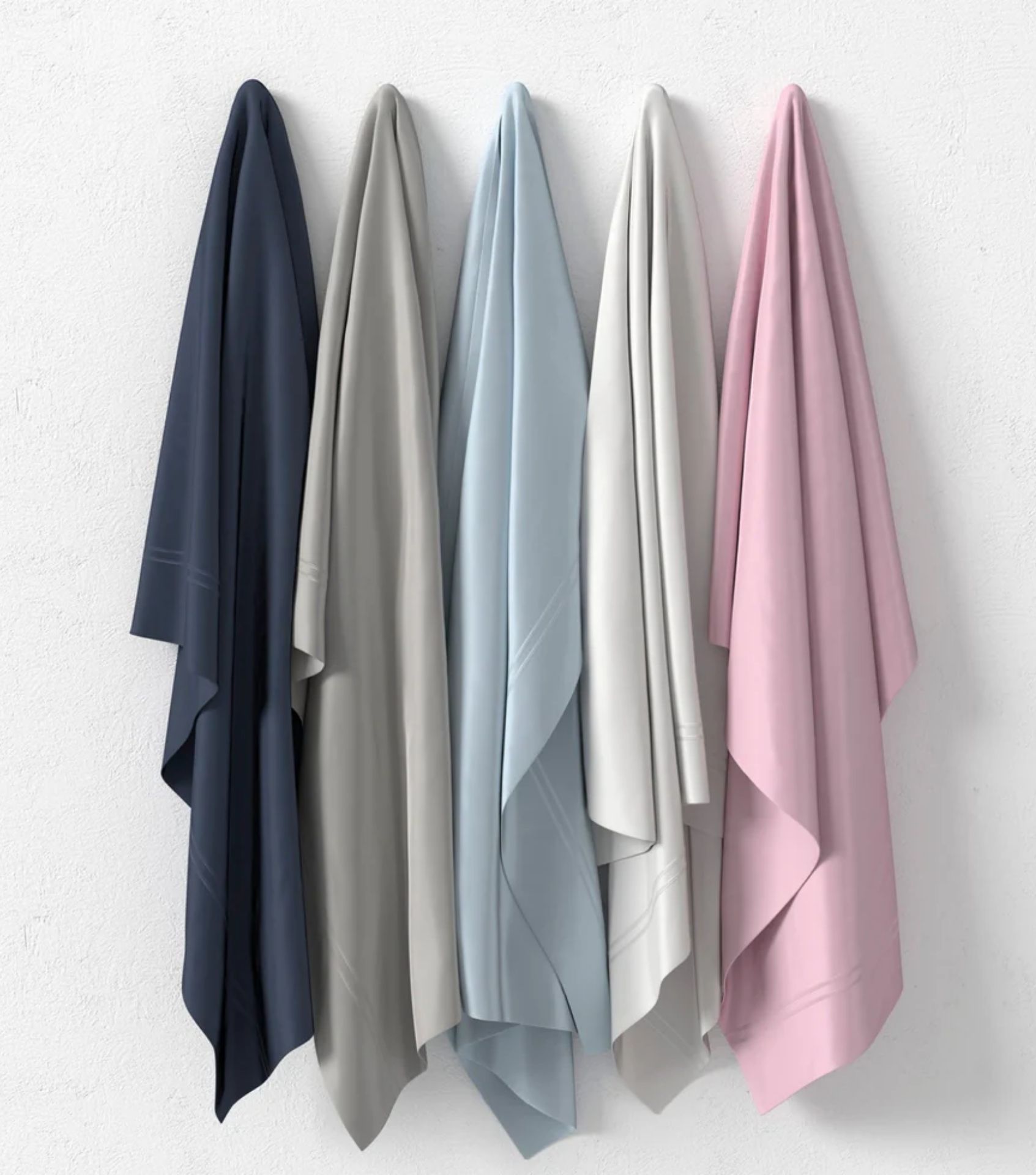
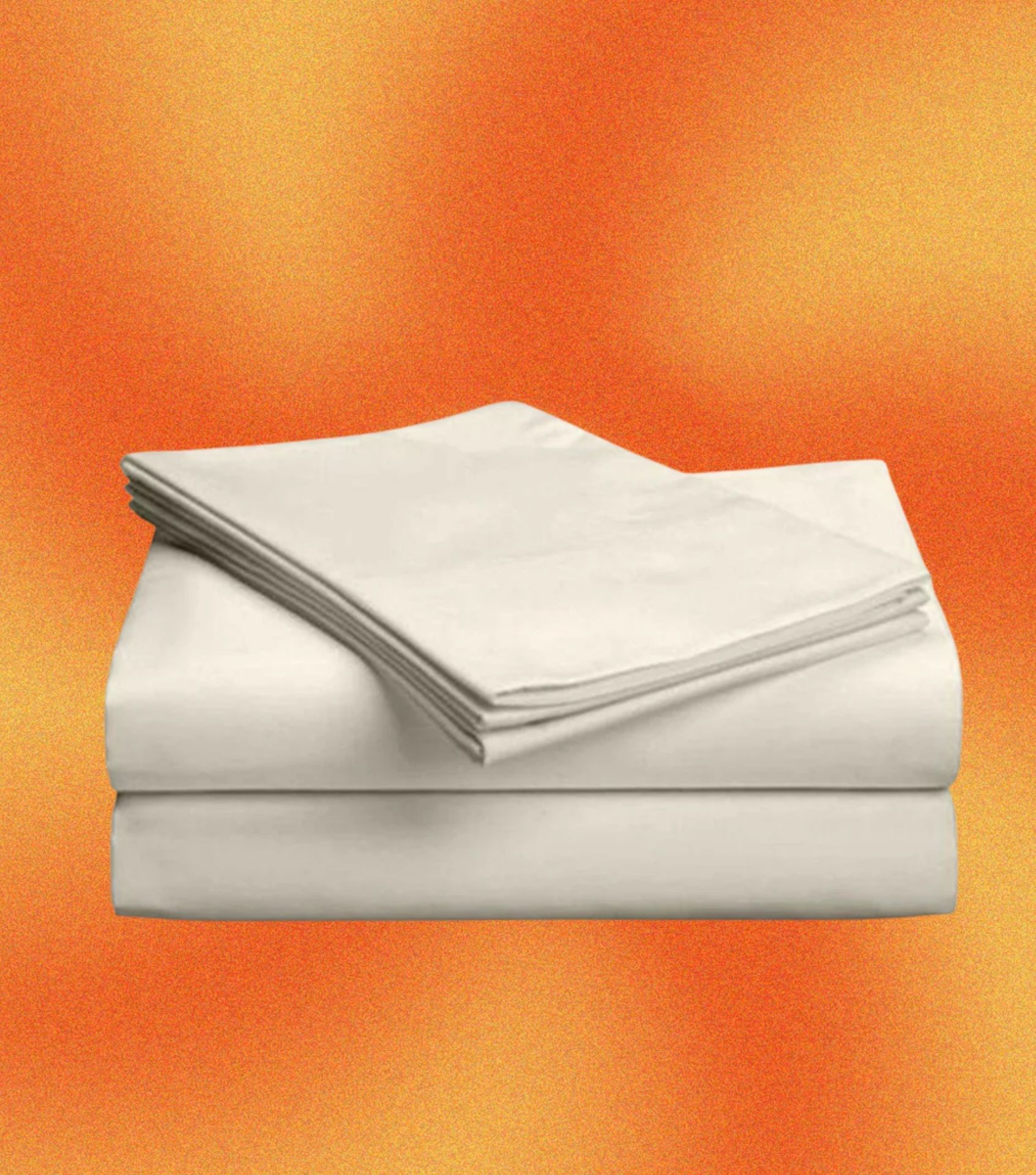
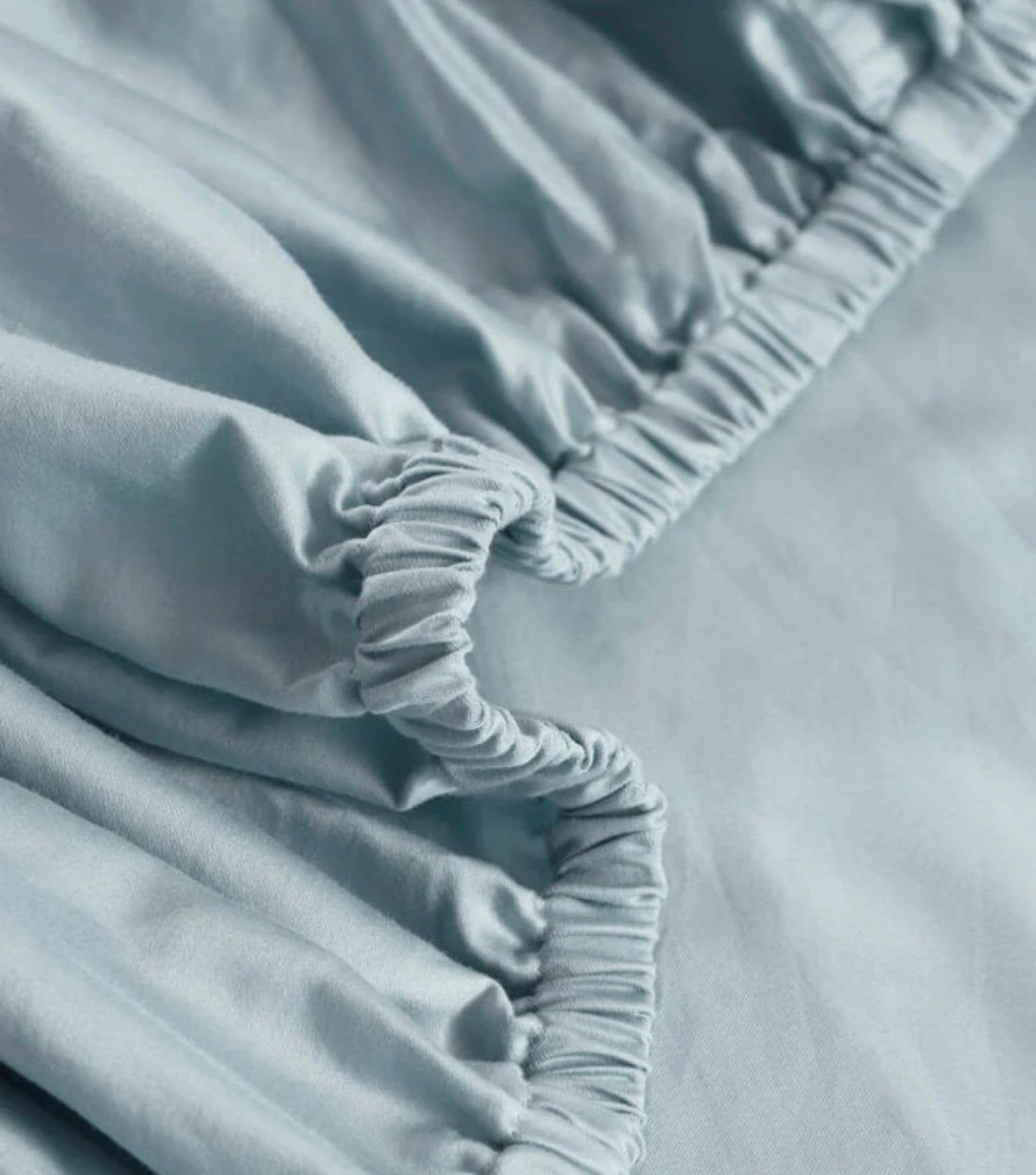
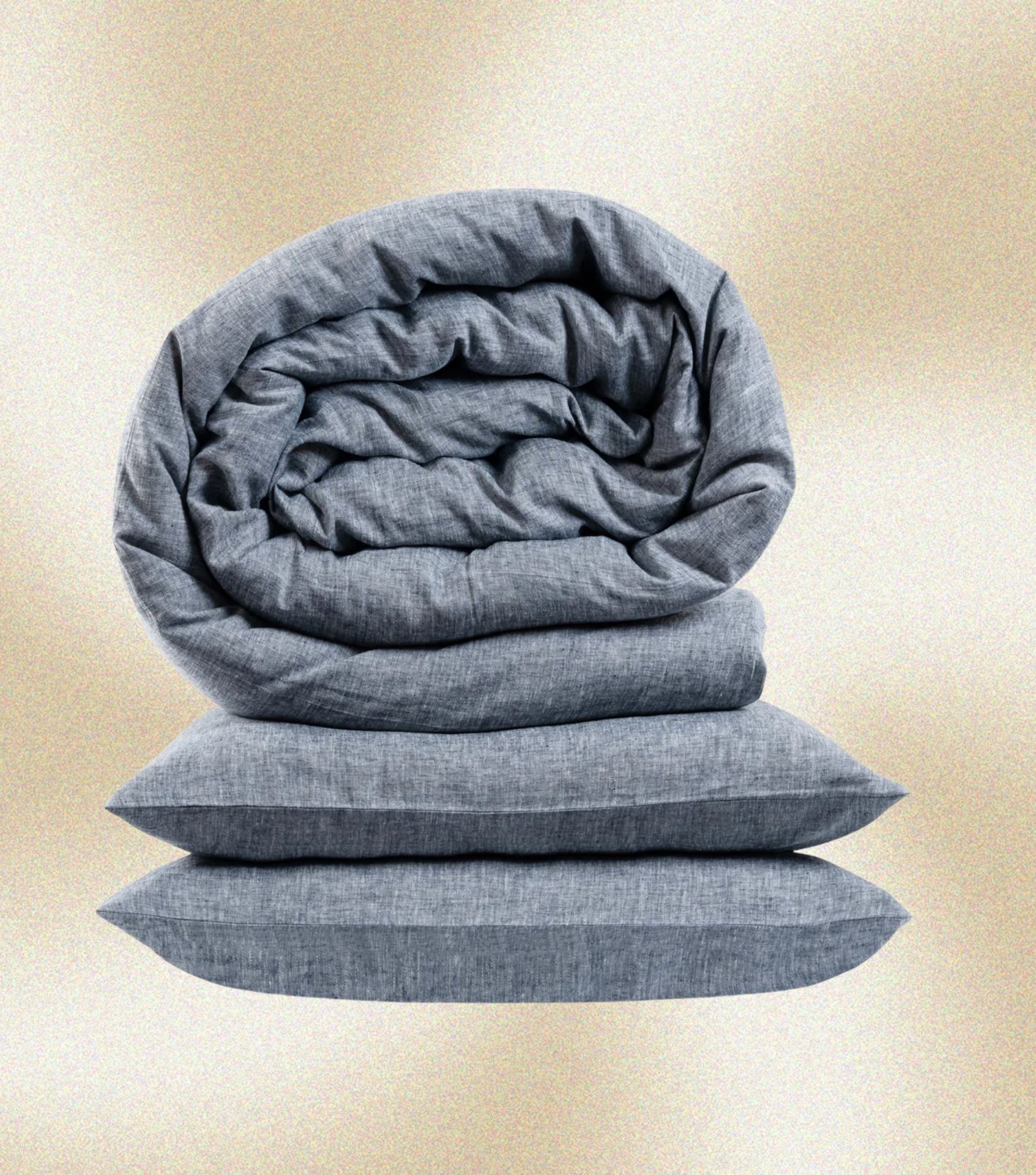
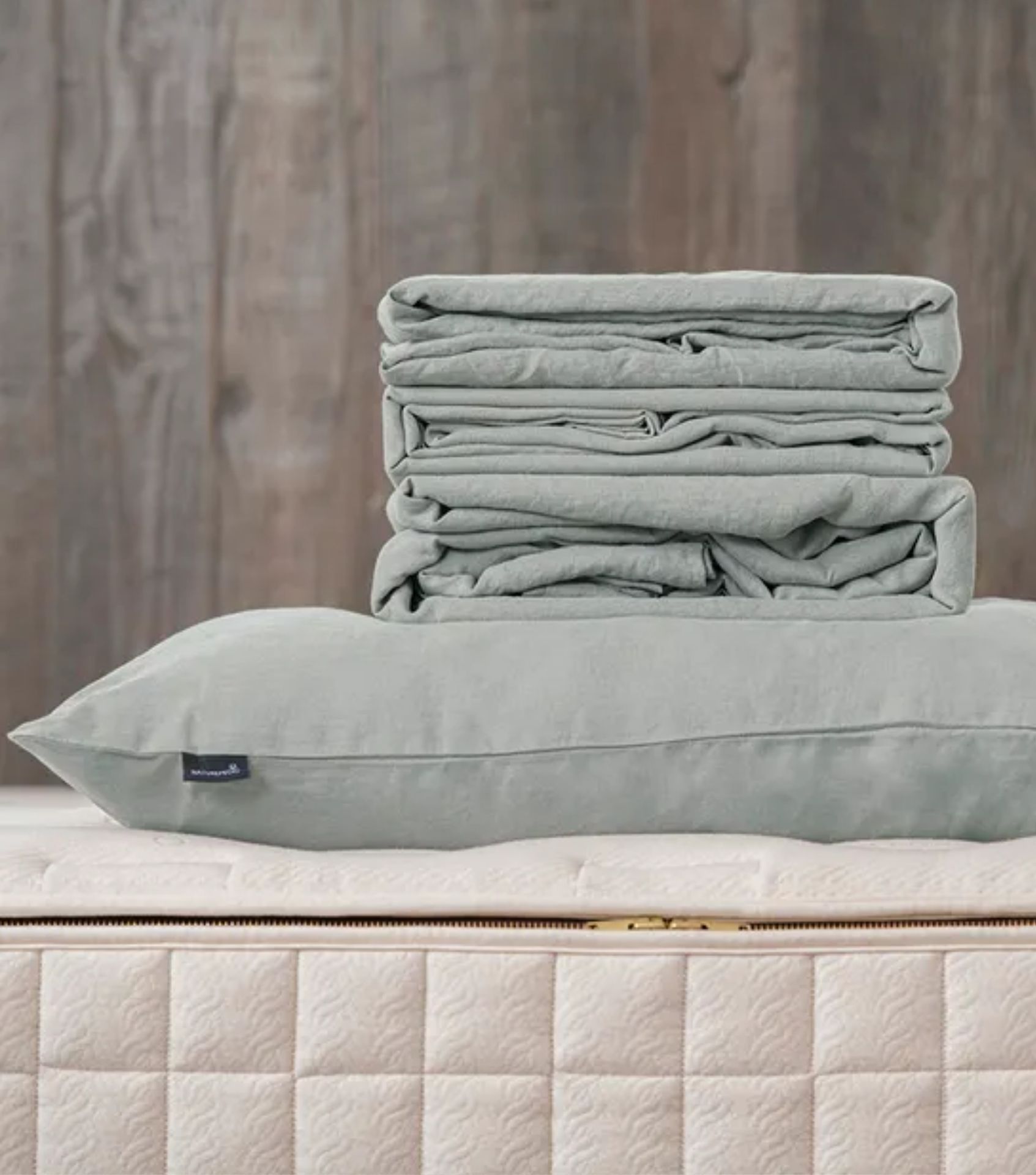
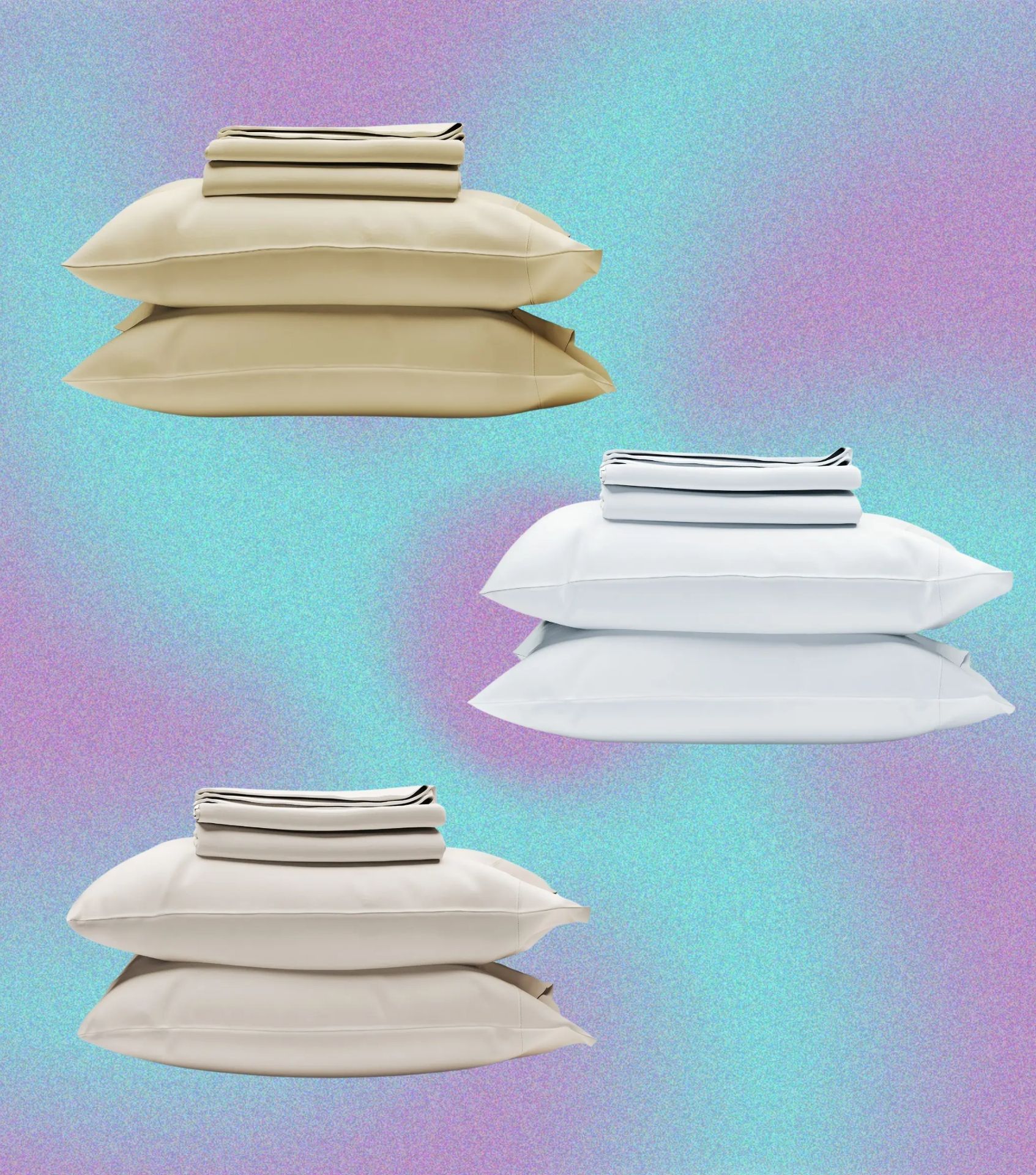
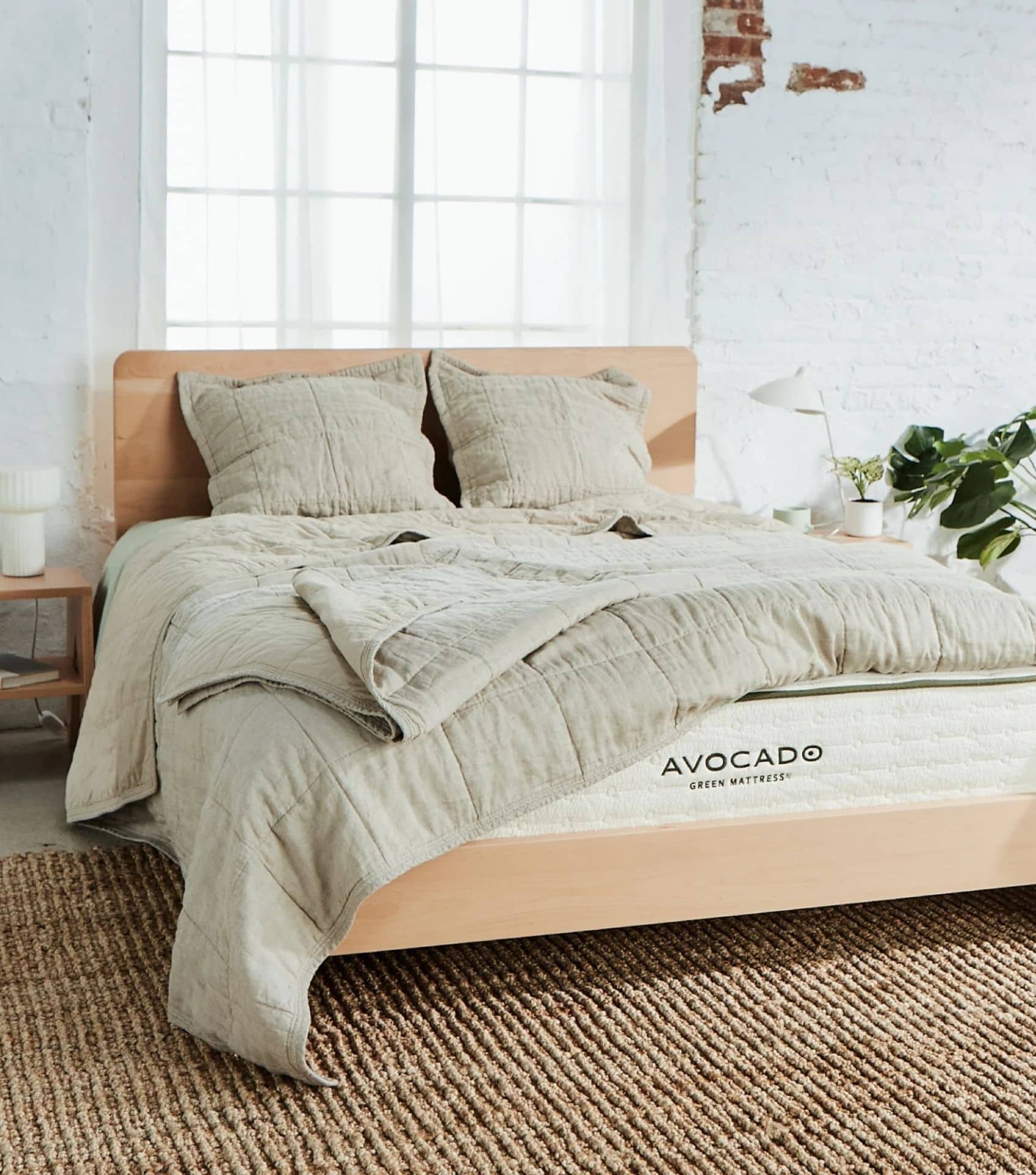
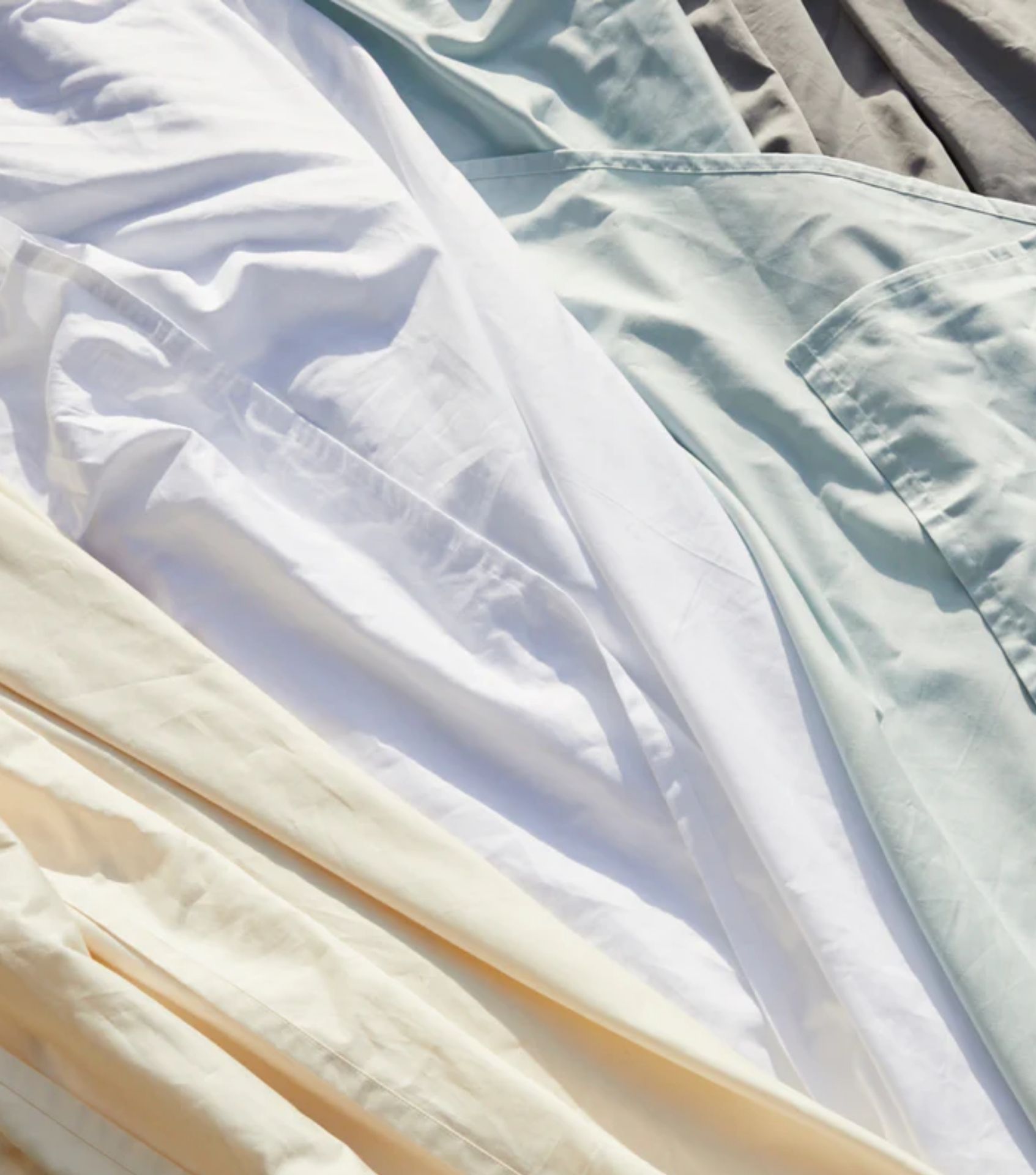
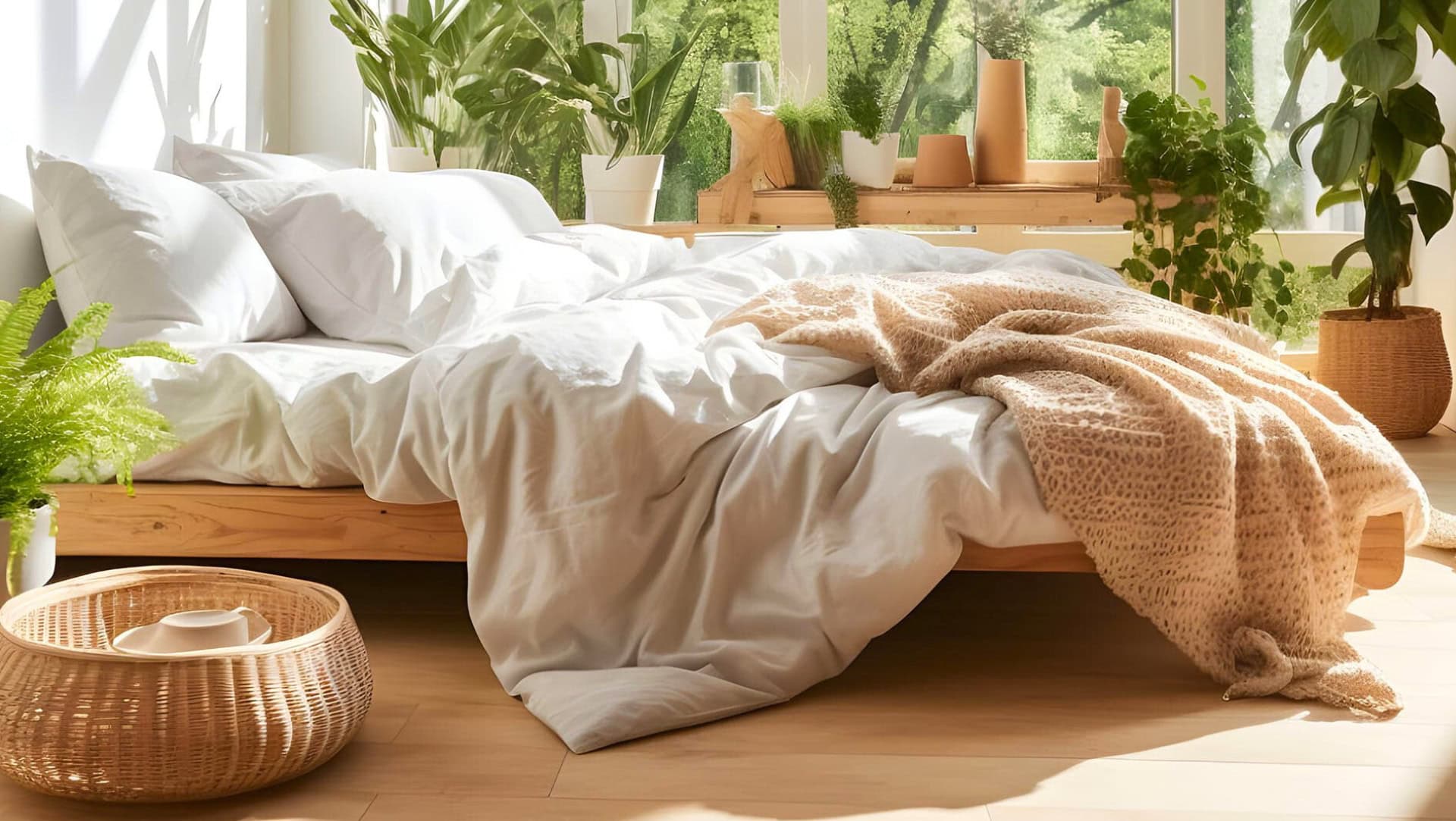
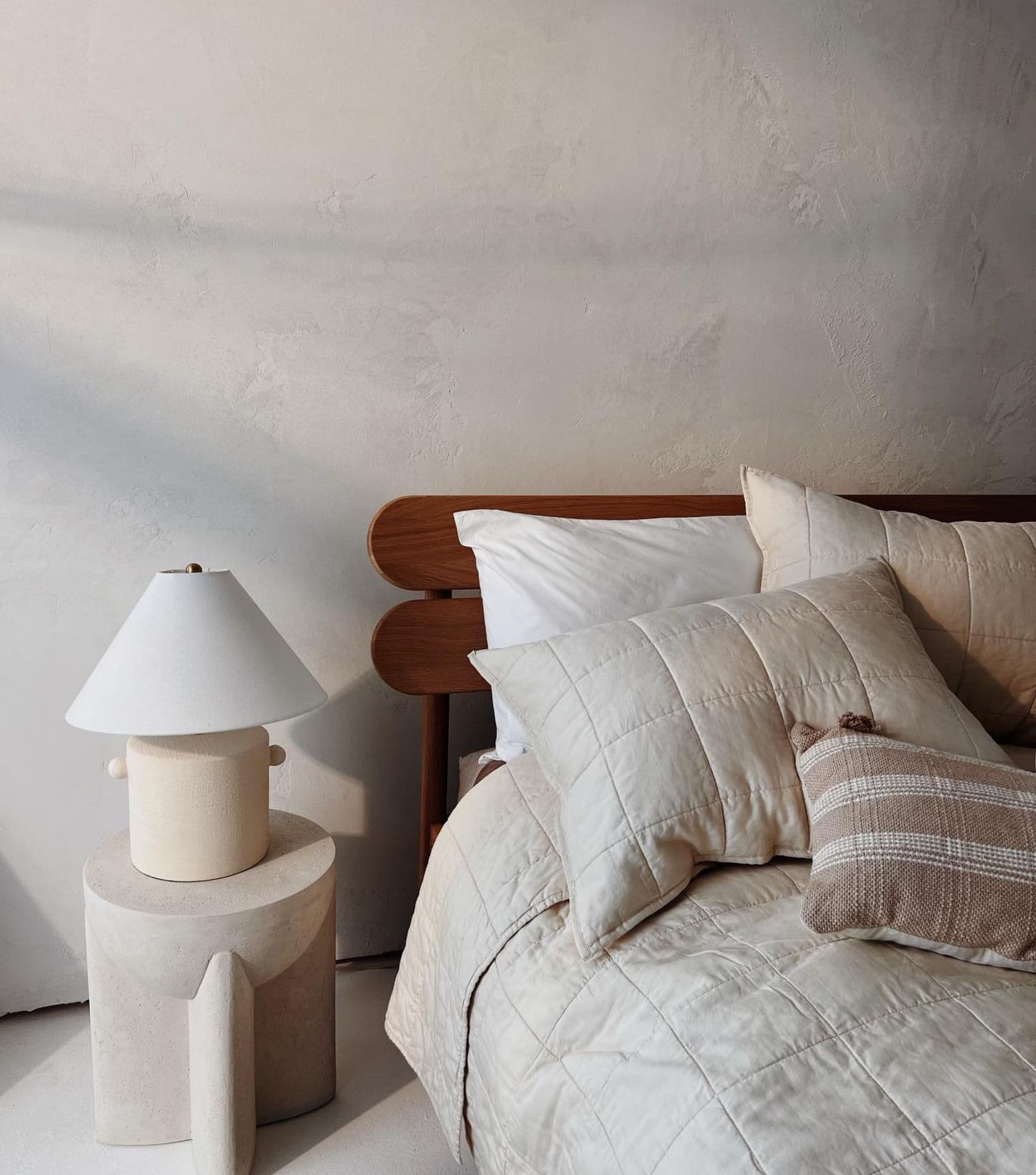
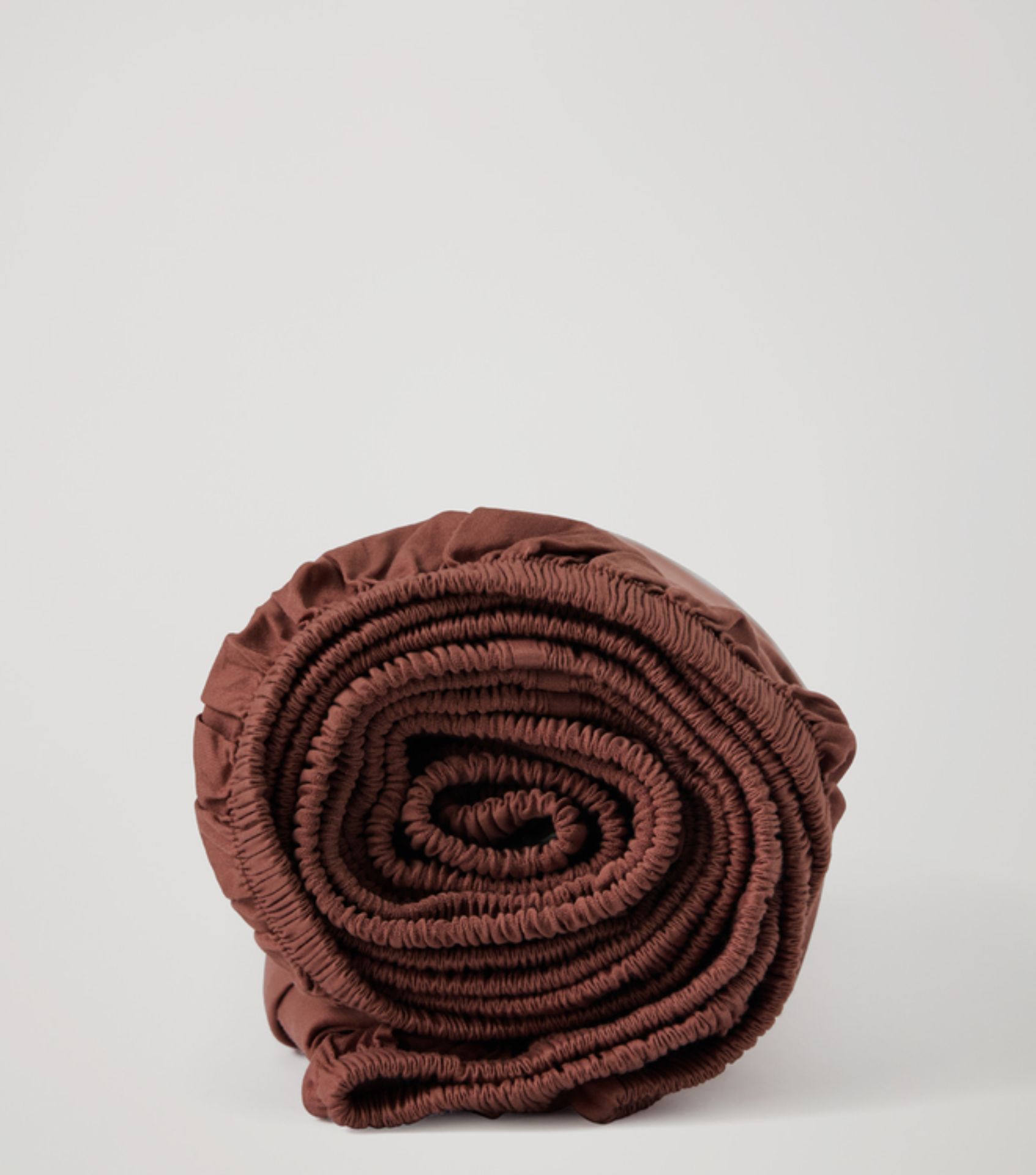
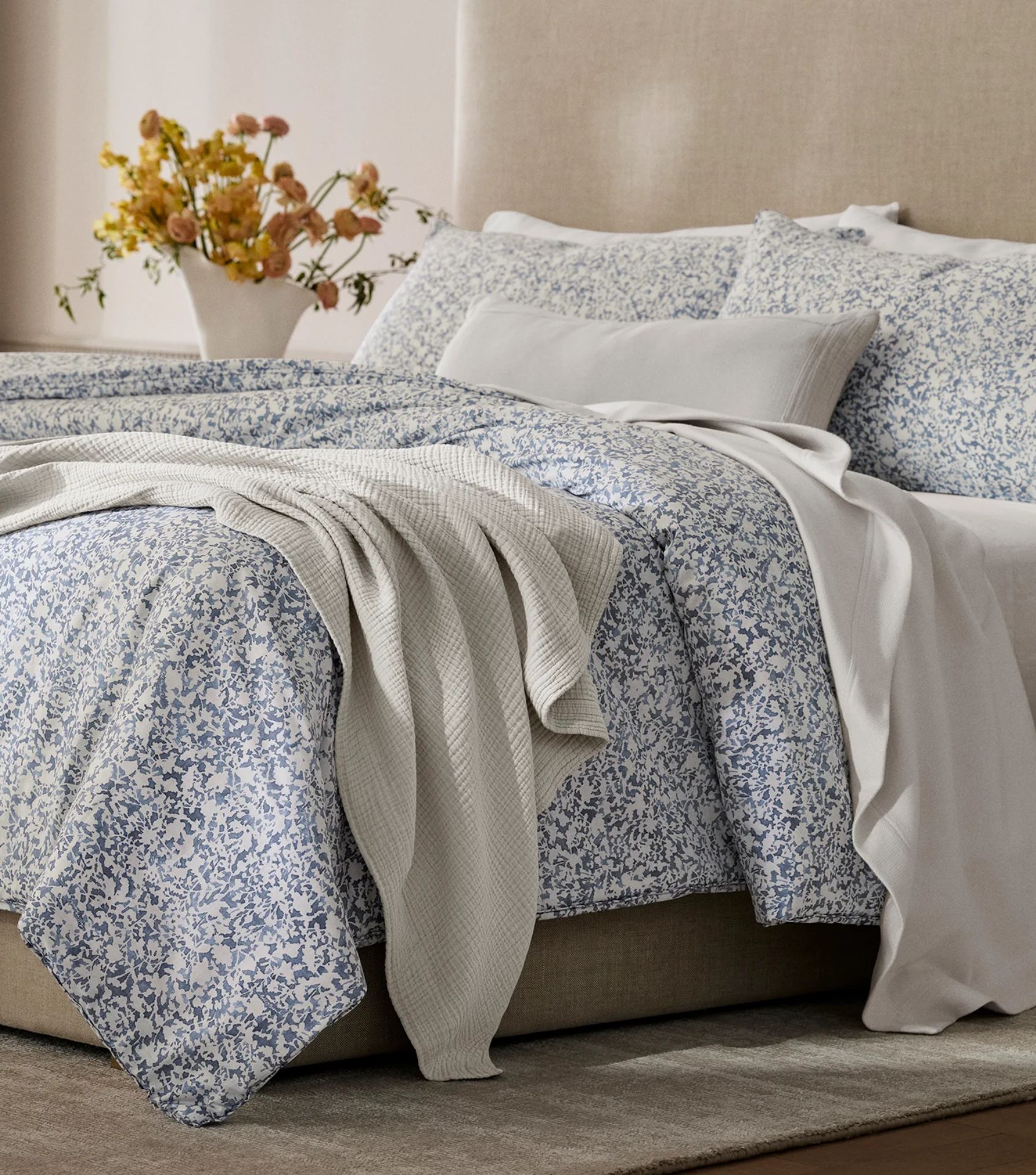
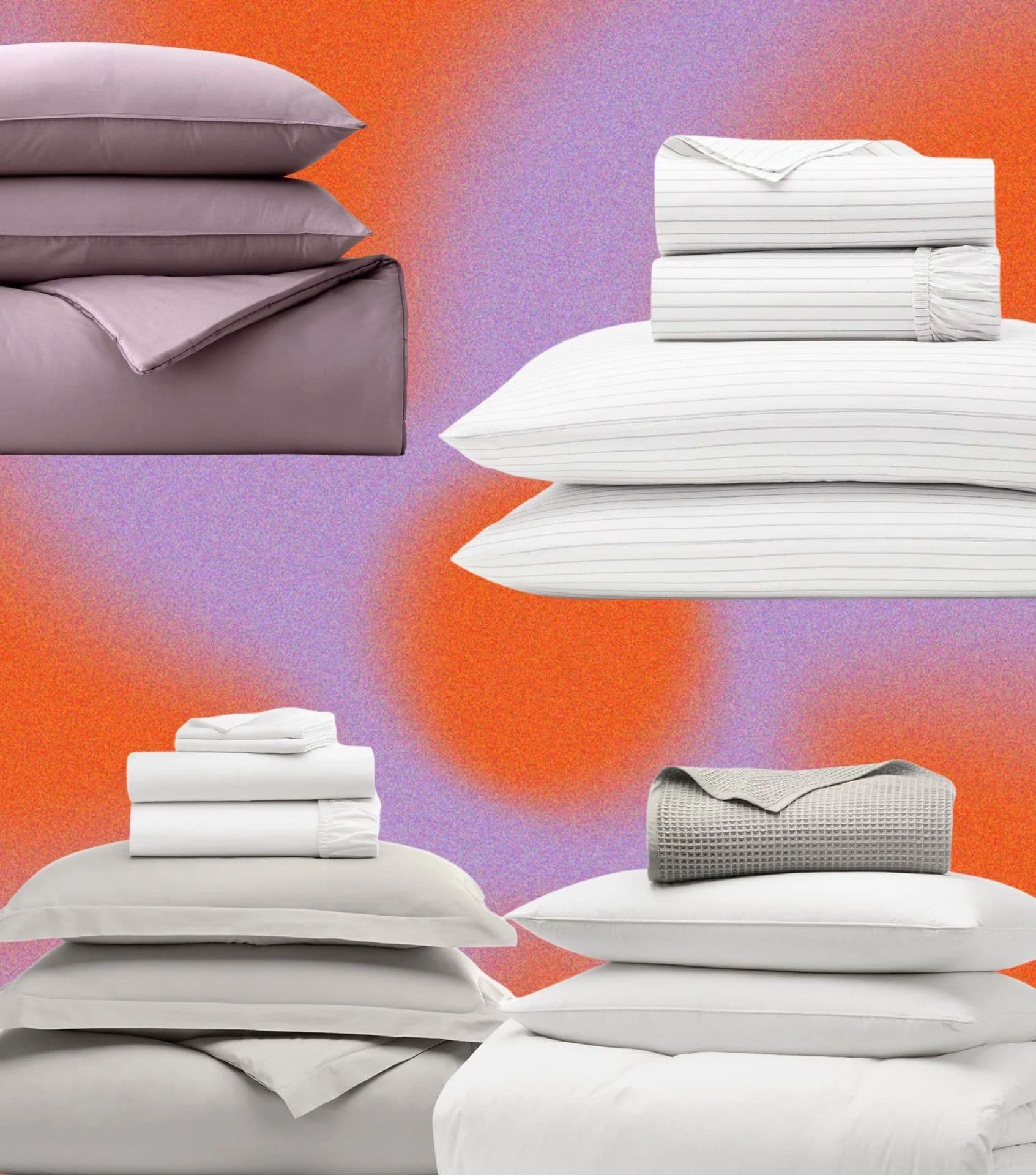
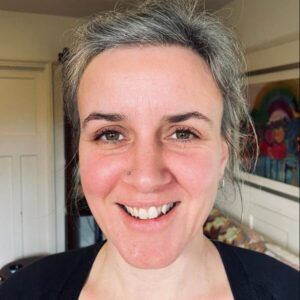
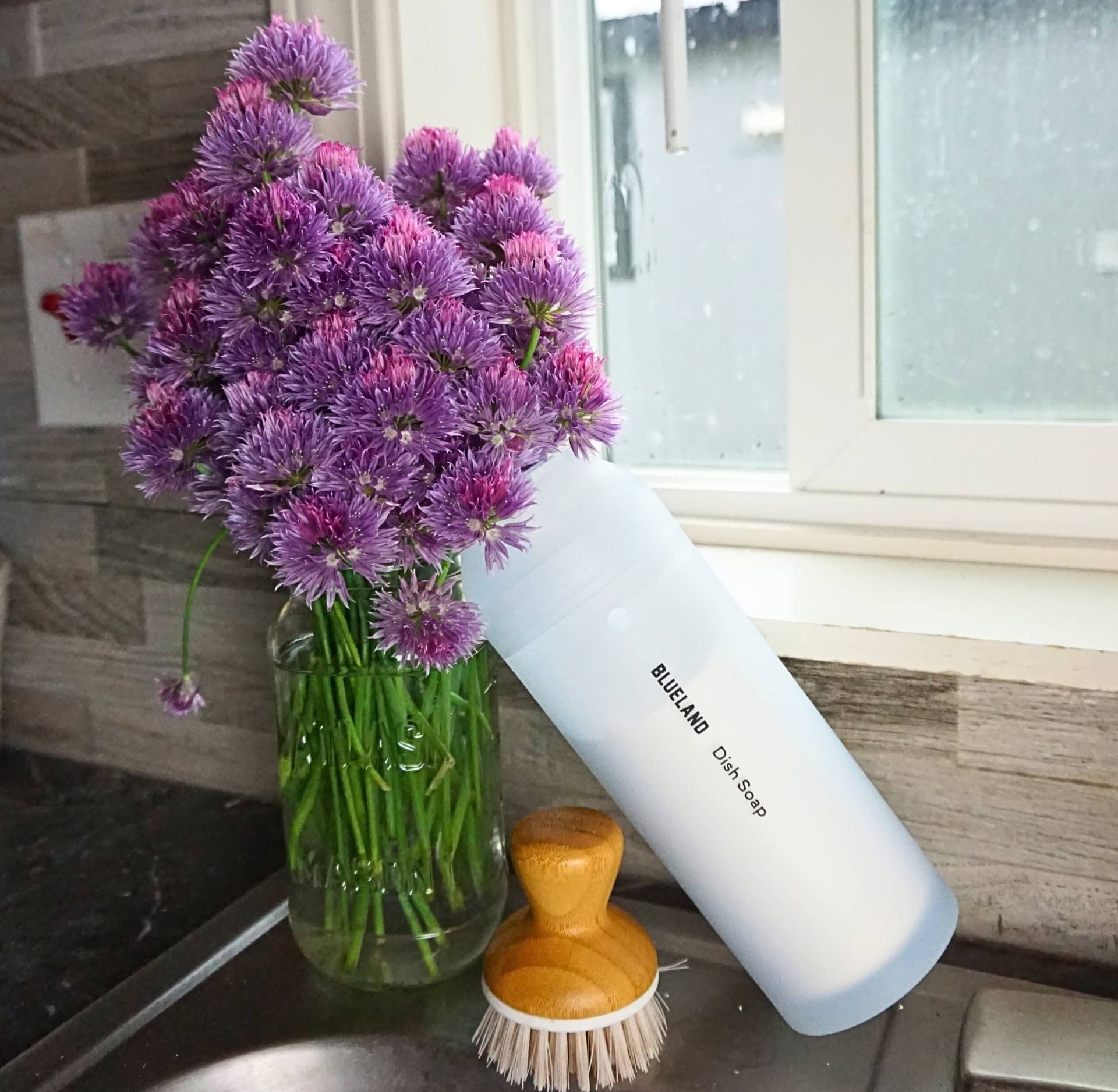

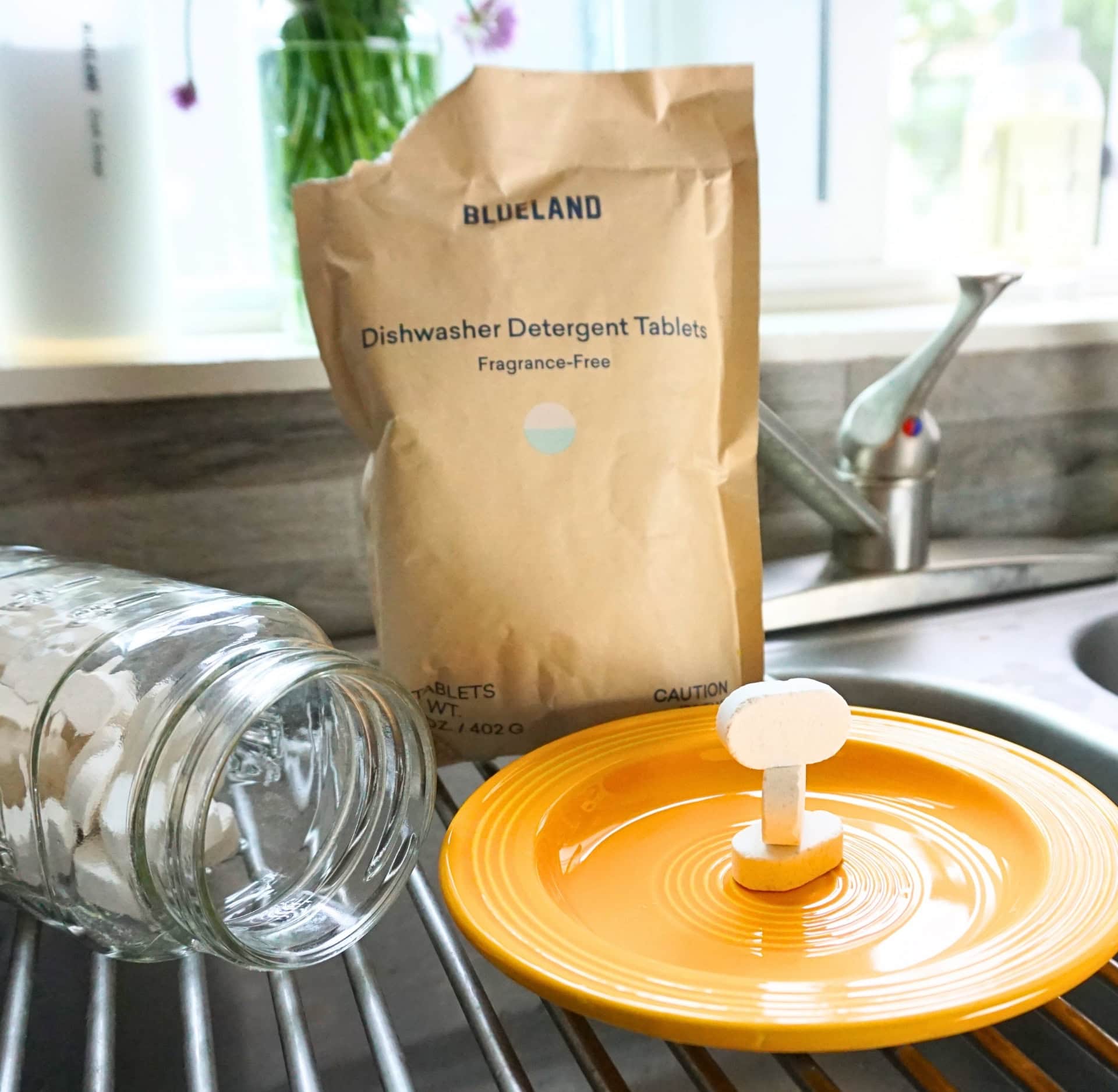

I’m surprised I’m not seeing brands like avacado and coyuchi, any reason for that?
Hi Samantha, no reason – we just feature Coyuchi and Avocado on a ton of other articles so wanted to share the love around a little more with this list given there are so many great sustainable bedding brands out there.
Thanks for the great information on brands and important facts regarding business practices that support being eco-friendly and reducing emissions etc. Awareness is the key!